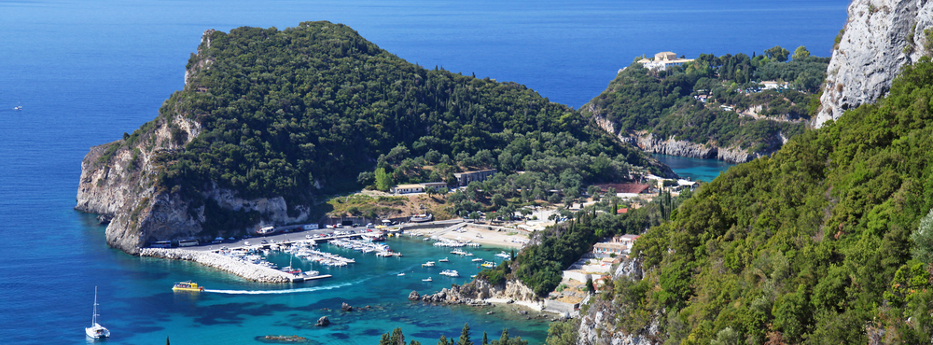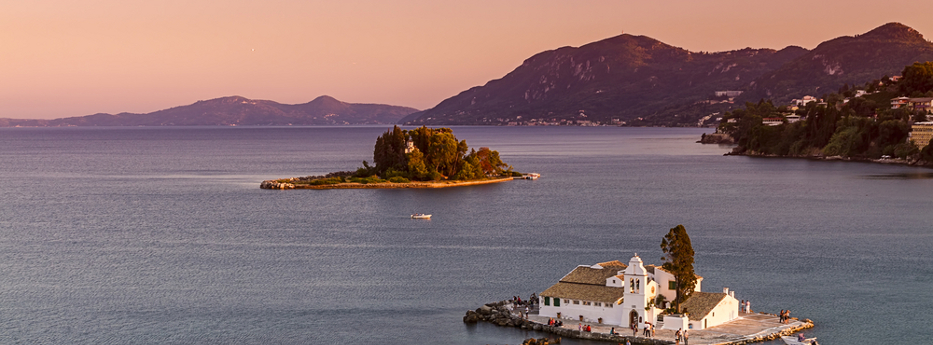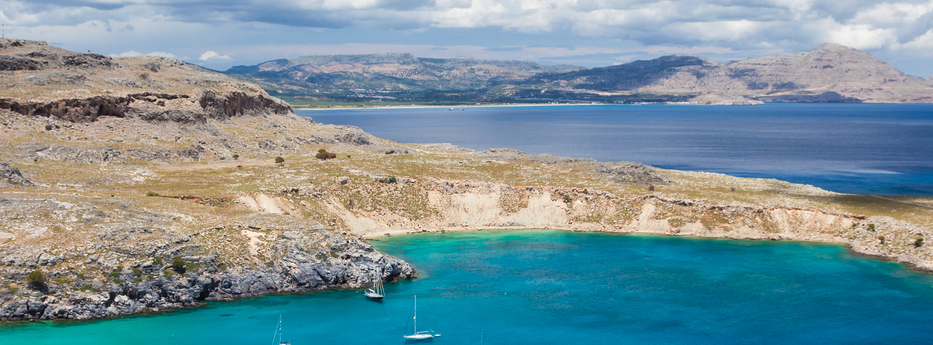Greece
- Home
- Greece
The Greek seas are multi-faceted, much more than most sailing areas. The fascination of exploring the land of the gods by yacht is inspired by the many islands, the romantic and in general inexpensive fishing harbours and the picturesque anchorages. But Greece has more to offer.
More than 3,000 islands and islets, each with their own character, have something for everyone. Rugged steep coasts with weird rock formations are replaced by shallow islands with beautiful bays and idyllic sandy beaches. The sun-drenched white-blue Cyclades islands are dry and arid in summer. Other islands, however, have luscious green and abundant vegetation. In the Sporades, in North Greece or in the Ionian Sea there are also places and islands covered in trees and green in summer.
You can still find spots in Greece that are peaceful and remote, even in high summer. The Peleponnes, Euboea or North Greece have been spared from mass tourism as well as sailing tourism. In contrast, there are night life regions such as Mykonos, Ios or Kos, which mainly attract young tourists and party-goers.

In the last two decades, new harbours and marinas have been built in the entire Mediterranean area. In Greece, however, several marina projects have started, but not been completed for various reasons. This explains why there are more than 500 harbours but only slightly more than 40 marinas in Greece today, and not all of them can be described as being well-developed yacht harbours. This is why yachts and local boats share the few available berths – this in turn leads to conflicts every now and then. The many picturesque town harbours such as Simi, Port Gaios or Kioni are unique as you can moor your yacht practically in the middle of the central market square. In other countries you would have to pay a small fortune for such great berths. In Greece, however, it is rare to find municipal harbours in Greece that charge more than 10 Euros for mooring fees. But this is exactly why the sanitary facilities are often poor, if they are even available at all. The organisation of the berths is slightly chaotic and the word “organisation” not always fitting. However, you will often somehow find a berth in the second or third row. Chaotic but also endearing, typically Greek.

Not only do the numerous harbours make Greece one of the most attractive sailing areas but so do the many anchorages. You drop your anchor in to crystal-clear water with good holding ground in a sandy seabed. The anchorage is surrounded by ragged cliffs with a small and romantic sandy beache at their feet. In summer, a local family runs a small tavern with a terrace right beside the sea. Otherwise there is nothing. Unspoiled countryside everywhere. You can often find idyllic anchor places like in Greece and if you come in the low season, then you will have a good chance of being alone and undisturbed.
Greece has a unique cultural wealth. The “Cradle of the West”, the inventors of democracy and the Olympic idea, the land of sagas, gods and myths, has an inexhaustible mixture of ancient sites. Evidence of the former empire can be found on nearly every island.
The Greek waters are regarded as windy. The probability of having calm seas for several successive days is low. Among sailors, the etesians - a typical summer wind, which develops its greatest strength in and around the Cyclades - is infamous.
The north wind is at its strongest in July and August, but it can also blow in June and September. It is not rare for the etesian winds to reach gale force strength and to last for several days. In North Greece and the Dodecanese, the wind is slightly weaker. In spring, autumn and winter, strong winds can also blow from the south. The Ionian Sea has a totally different weather system and is mainly characterised by thermal winds.

When it comes to food, Greece is well-known for its fresh fish, tasty fruit and vegetables, fresh salads with olive oil, and lamb and goat meat in all variations. The Greeks love sitting around a table full of starters and small main dishes and eating for hours on end. Now and then they drink a Greek coffee (mocha) or an ouzo to help digest it all.
Check out what you can discover in Greece.
More than 3,000 islands and islets, each with their own character, have something for everyone. Rugged steep coasts with weird rock formations are replaced by shallow islands with beautiful bays and idyllic sandy beaches. The sun-drenched white-blue Cyclades islands are dry and arid in summer. Other islands, however, have luscious green and abundant vegetation. In the Sporades, in North Greece or in the Ionian Sea there are also places and islands covered in trees and green in summer.
You can still find spots in Greece that are peaceful and remote, even in high summer. The Peleponnes, Euboea or North Greece have been spared from mass tourism as well as sailing tourism. In contrast, there are night life regions such as Mykonos, Ios or Kos, which mainly attract young tourists and party-goers.

In the last two decades, new harbours and marinas have been built in the entire Mediterranean area. In Greece, however, several marina projects have started, but not been completed for various reasons. This explains why there are more than 500 harbours but only slightly more than 40 marinas in Greece today, and not all of them can be described as being well-developed yacht harbours. This is why yachts and local boats share the few available berths – this in turn leads to conflicts every now and then. The many picturesque town harbours such as Simi, Port Gaios or Kioni are unique as you can moor your yacht practically in the middle of the central market square. In other countries you would have to pay a small fortune for such great berths. In Greece, however, it is rare to find municipal harbours in Greece that charge more than 10 Euros for mooring fees. But this is exactly why the sanitary facilities are often poor, if they are even available at all. The organisation of the berths is slightly chaotic and the word “organisation” not always fitting. However, you will often somehow find a berth in the second or third row. Chaotic but also endearing, typically Greek.

Not only do the numerous harbours make Greece one of the most attractive sailing areas but so do the many anchorages. You drop your anchor in to crystal-clear water with good holding ground in a sandy seabed. The anchorage is surrounded by ragged cliffs with a small and romantic sandy beache at their feet. In summer, a local family runs a small tavern with a terrace right beside the sea. Otherwise there is nothing. Unspoiled countryside everywhere. You can often find idyllic anchor places like in Greece and if you come in the low season, then you will have a good chance of being alone and undisturbed.
Greece has a unique cultural wealth. The “Cradle of the West”, the inventors of democracy and the Olympic idea, the land of sagas, gods and myths, has an inexhaustible mixture of ancient sites. Evidence of the former empire can be found on nearly every island.
The Greek waters are regarded as windy. The probability of having calm seas for several successive days is low. Among sailors, the etesians - a typical summer wind, which develops its greatest strength in and around the Cyclades - is infamous.
The north wind is at its strongest in July and August, but it can also blow in June and September. It is not rare for the etesian winds to reach gale force strength and to last for several days. In North Greece and the Dodecanese, the wind is slightly weaker. In spring, autumn and winter, strong winds can also blow from the south. The Ionian Sea has a totally different weather system and is mainly characterised by thermal winds.

When it comes to food, Greece is well-known for its fresh fish, tasty fruit and vegetables, fresh salads with olive oil, and lamb and goat meat in all variations. The Greeks love sitting around a table full of starters and small main dishes and eating for hours on end. Now and then they drink a Greek coffee (mocha) or an ouzo to help digest it all.
Check out what you can discover in Greece.